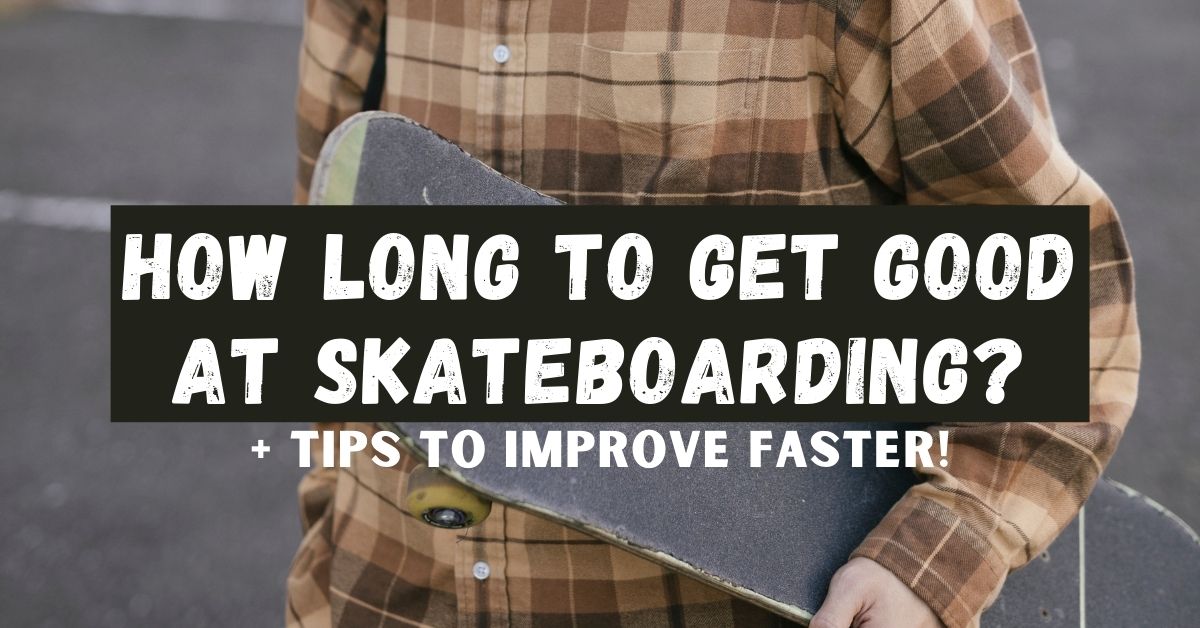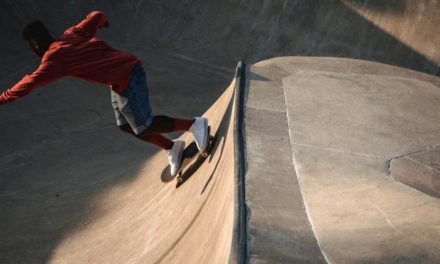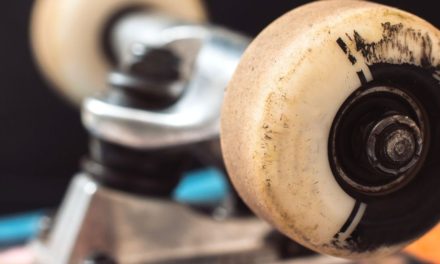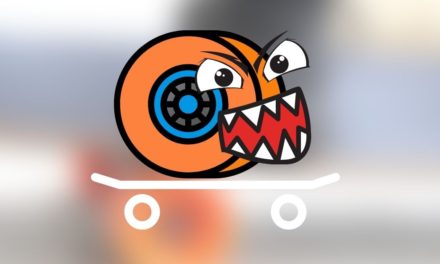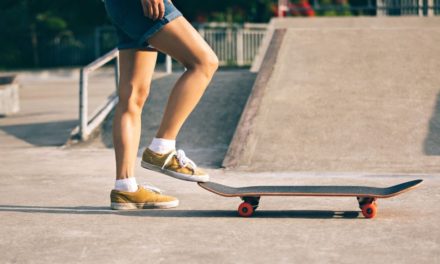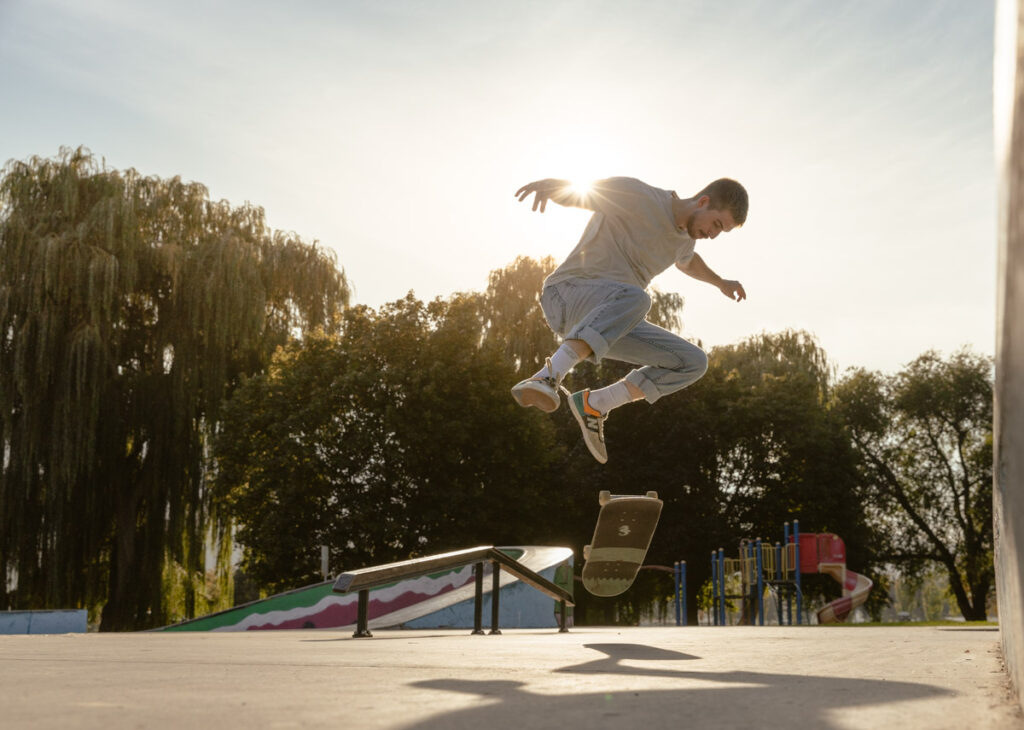When you first start riding a skateboard, your first thought might be how long does it take to get good at this? Going to the skatepark, you’ll see just about everyone sliding rails and grinding ledges, and it’s flat-out intimidating. You probably think that the only way to get good at skateboarding is to start as a young kid. Luckily, that’s not the case!
Starting from the basics, you can get good at skateboarding within 8-12 months depending on how often you practice. In this time span, many skaters begin to land their first ollies, grinds, or even their first flip tricks. However, it’s important to remember that everyone learns at their own pace.
Depending on where you’re at, this timeline can make you feel hard on yourself if you’re not reaching the skill level you expected. So remember, what counts as “good” is different for everyone, and what’s most important is to set goals for yourself. That’s why in this post, I want to offer you some actionable tactics to help you improve your skateboarding fast!
How Long Does It Take To Get Good At Skateboarding? (Timeline)
Let’s break down a general timeline you can expect to follow as you start to get better at skateboarding. Just remember that your level of progression can vary from this depending on your prior experience with riding skateboards. This timeline assumes you have never ridden a skateboard and intent to practice frequently.
Month 0-1: Learning how to ride your skateboard and getting more comfortable with pushing around and moving at higher speeds.
Month 2-4: Now you’re starting to practice some of the most basic skateboarding tricks like manuals, small ollies, and rolling off small drops (like curbs).
Month 5-8: Getting more dialed at the tricks you do know while adding more to your arsenal. During this timeline, you might expect to try your first grinds and slides and improve your ollies even more.
Month 9-12: At this point, you are starting to feel comfortable with ollies, shuvits, and maybe even kickflips and heelflips. You are getting more comfortable with grinds and can get onto higher ledges and rails.
Month 12+: Now that you have the basics, it’s time to identify your goals and what you want to get better at in skating. Start focusing on bowl or street and figure out what type of skating is the most fun for you!
10 Tips To Help You Get Good At Skateboarding In Less Time
Let me start with a personal story. When I first learned to skateboard, it took me longer than all my friends to land tricks. What came easy to everyone else seemed impossible to me. So I know how it feels if you feel a bit stuck in your progression.
With my experience as a worse-than-average beginner skater, I learned a handful of tips that helped me get a lot better, and I know they’ll help you too.
1. Practice Often
This might seem pretty obvious, but take this to heart. If you want to get better, you need to practice; plain and simple. Think about any sport you’ve played, especially at a competitive level. For example, when I played ice hockey, I’d be playing games or at practice six days a week. It sure felt like a lot at the time, but man, did my gameplay ever improve. The same thing applies to skateboarding.
Even if you can’t get to the park, roll around outside your house or take your dog for a “walk” while you skateboard. The more time you spend skating, the faster you’ll feel more comfortable on your board.
Repetition builds muscle memory which, in turn, makes your most practiced tricks feel like a walk in the park. With that said, it’s important to keep your practice consistent, so you don’t feel rusty after a month or two away from skating. Try to get an hour in whenever you can (even just outside of your house), and you’ll quickly feel yourself improve.
2. Focus On Progressing In Small Steps
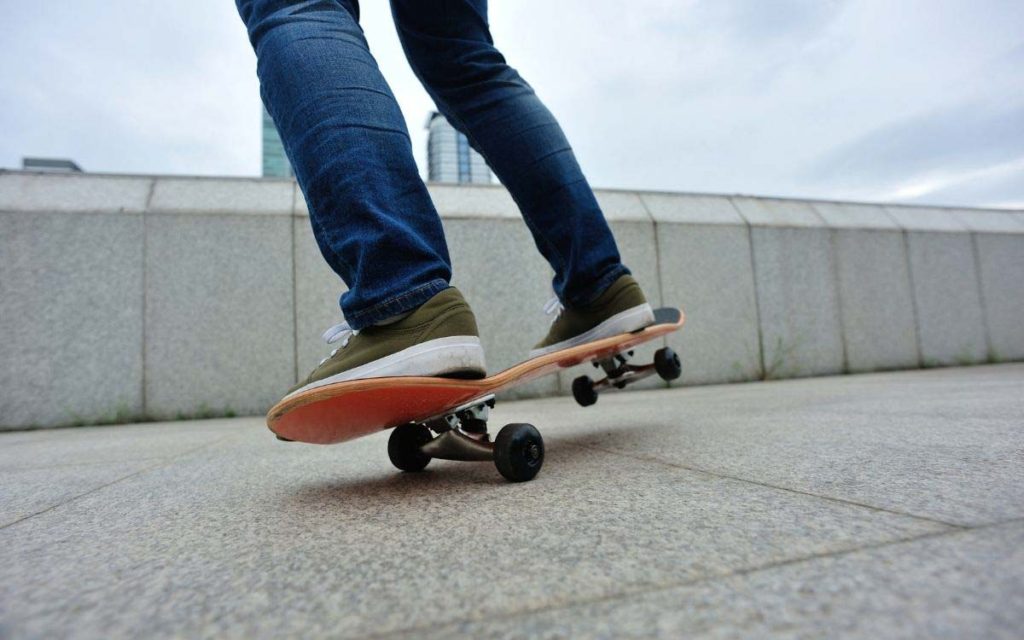
A lot of skaters like to immediately jump to the biggest and baddest thing they can do. I can tell you from personal experience you’re probably walking yourself straight into an injury. Just because you learned how to ollie doesn’t mean you’re ready for the 12 stair at the skatepark.
Instead, focus on the small sequential steps of progression. Let’s take something really easy, like a manual, for example. Once comfortable riding your skateboard, you can put a little more weight on the tail and get into a manual. At first, just lifting your front trucks for a second or two will feel like a lot, and that’s okay. Just continue to practice until it feels easy.
Once you feel comfortable just getting into a manual, try holding a manual between two cracks in the sidewalk.
Then try to hold a manual while rolling off a curb.
Then try to manual out of a bank at your local park.
Eventually, you will feel so comfortable with the trick that you can manual anywhere and mix it into your other tricks with an ollie to manny on a box, for example. You became so comfortable because you gradually progressed the trick to a higher and higher level of difficulty; without getting too far from your comfort zone.
This same principle should apply to every trick you learn, and you’ll notice significant improvements very quickly!
3. Find Friends To Skate With
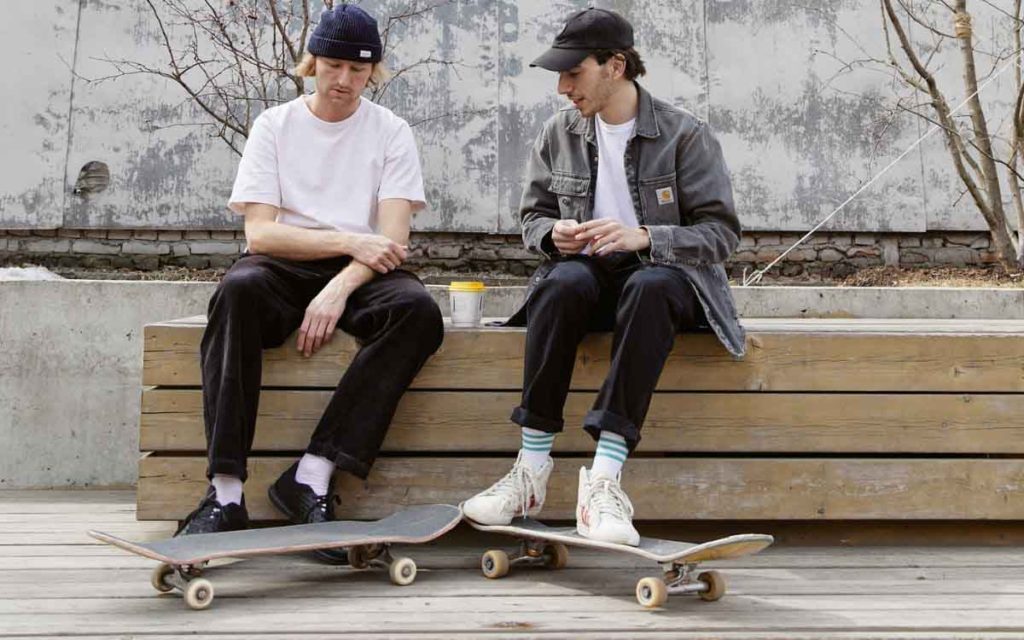
Getting out and skating with friends is a great way to challenge yourself and try things that you probably wouldn’t do on your own. There have been so many times that I saw my friend do something I never even thought of trying before. Getting inspiration from others can go a long way. Better yet, you can egg each other on with a bit of friendly competition.
If you don’t know anyone that skates, visit your local skatepark and spend a day or two getting a vibe for the local scene there. Once you feel comfortable, start chatting with people and session different spots of the park together!
4. Set Trick Goals For Yourself
Building off what I mentioned in tip number two, set goals for yourself, and build off the tricks you already know. For example, if you just landed your first ollie, a goal could be to ollie over a skateboard on the ground. If you just landed your first manual off a curb, set a goal of mannying off a bigger box at the skatepark.
Setting goals gives you something to work towards and prevents plateaus in your progression. As long as you have a goal, you’re guaranteed to get better at skateboarding.
5. Frequently Repeat All Your Tricks
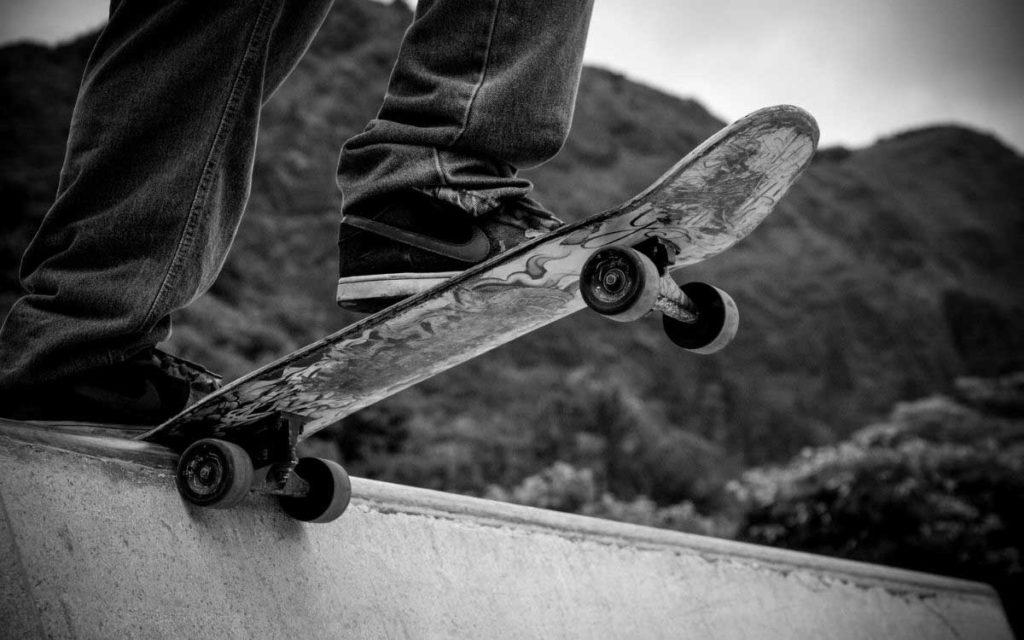
One of the most valuable tips I was ever told in skateboarding was to practice every trick you know as much as possible. This might sound kind of boring, but consider it a way to refine your bag of tricks. To give you an example, many people learning how to skateboard might land their first 180 and not try it again for weeks. Then, the next time they try it, they’re back to square one, struggling to land the trick.
That’s why the second you land a new trick, add it to your list of things you do every time you go skating. At first, this list of tricks might be small, but it doesn’t matter. Since you will be practicing them so often, they will feel easy and help with progression into other tricks.
6. Learn When To Take A Break From Skating
I’ve seen so many skaters get frustrated when they can’t land a trick. Sometimes, the best thing you can do is take a couple of days off of skating to let your body rest, especially if you’ve been taking a few good slams recently.
Taking time to recover helps the body, but more importantly, your mind, to feel sharper and ready for action the next time you skate. Just because you’re exhausting yourself skating every day doesn’t mean you’re going to get good at it. Sometimes a break is just what you need to see more improvements.
7. Start Your Tricks Small
When you’re trying to get good at skateboarding, you might feel like you have to pop your tricks as high as possible. Even more, you feel like you have to do them with perfect steez. So trust me when I say to throw that idea out the window and start as small as possible.
If you pop your first ollie and it’s only an inch off the ground, celebrate it and feel stoked at your progression! Doing tricks bigger and with more style only comes after you practice them a lot. By being okay with starting small, you’ll gradually find yourself going bigger and bigger.
8. Go To New Parks & Skate Spots
If you always skate in the same place, going to a new skatepark or street spot can help you get better at skateboarding. It’s easy to start getting in a routine and feeling comfortable skating the same features all the time. Of course, that’s not a bad thing, but skating in new places will challenge your skills and expand your comfort level.
For example, you might have learned to boardslide on the flat bar at your skatepark. However, the skatepark across town has a taller flat bar you could skate to take it to the next level. Trying tricks you already know on new, unfamiliar features is an excellent way to get better at the tricks.
9. Make Sure You’re Using The Right Skateboard
Everyone’s classification of what a “good” skateboarder is may vary. The type of skateboarding you want to get good at can vary too. Maybe you’re the type of person who wants to cruise around town on a penny board and doesn’t care about ever leaving the ground. If that’s the case, consider what type of skateboard you’re using and how that may affect what you practice.
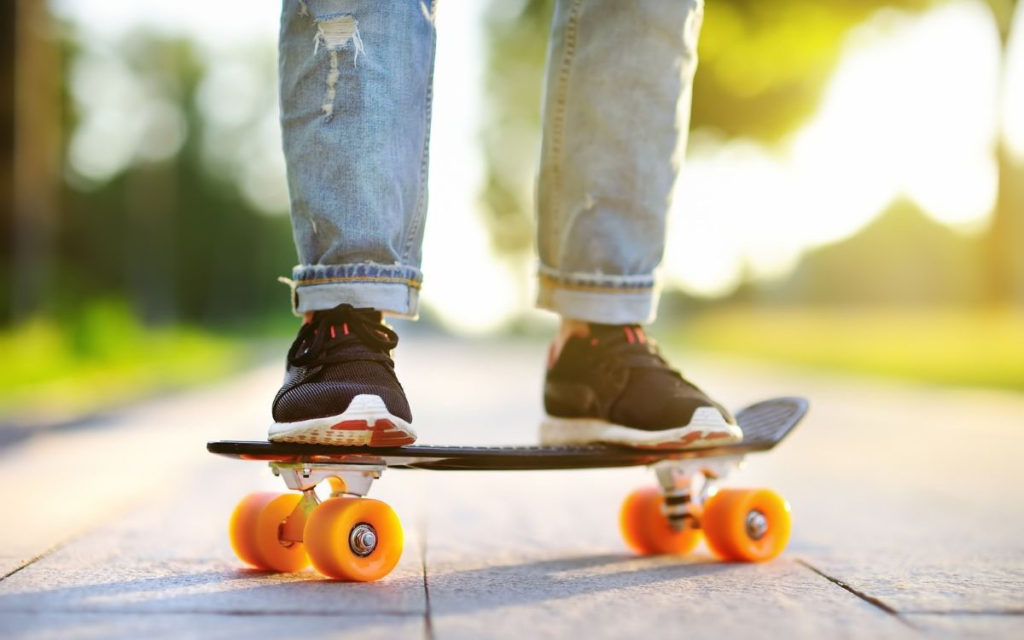
For example, if you’re skating a penny board but are wanting to land your first ollies and 5050’s, I think it’s time to consider switching your setup. If you’re unsure, go into your local skate shop and explain the type of skating you want to get into. They’ll be able to set you up with the perfect skateboard for your style of skating.
10. Challenge People To A Game Of SKATE
The last tip to help you get good at skateboarding in less time is playing SKATE and playing it often. If you are unfamiliar, the game of SKATE is like HORSE in Basketball. One person sets a trick while the other person has to copy it. If you fail at landing the trick, you get a letter. Whoever gets all five letters in SKATE loses.
The benefit of playing this game is it adds a level of competition to your skating. Rather than having no reason to try hard and land something, you finally have something for motivation. I’ve landed a lot of tricks for the first time during games of skate simply because I wanted to win. I’m willing to bet you’ll feel the same way!
The amount of time it takes to get good at skateboarding will be different for everyone. The most important thing is to celebrate the small wins and don’t be too hard on yourself. What comes easy to you might not be for others and vice versa. By identifying your goals and building up your tricks slowly, you’ll quickly notice significant improvements over the coming months!
Happy Shredding!

